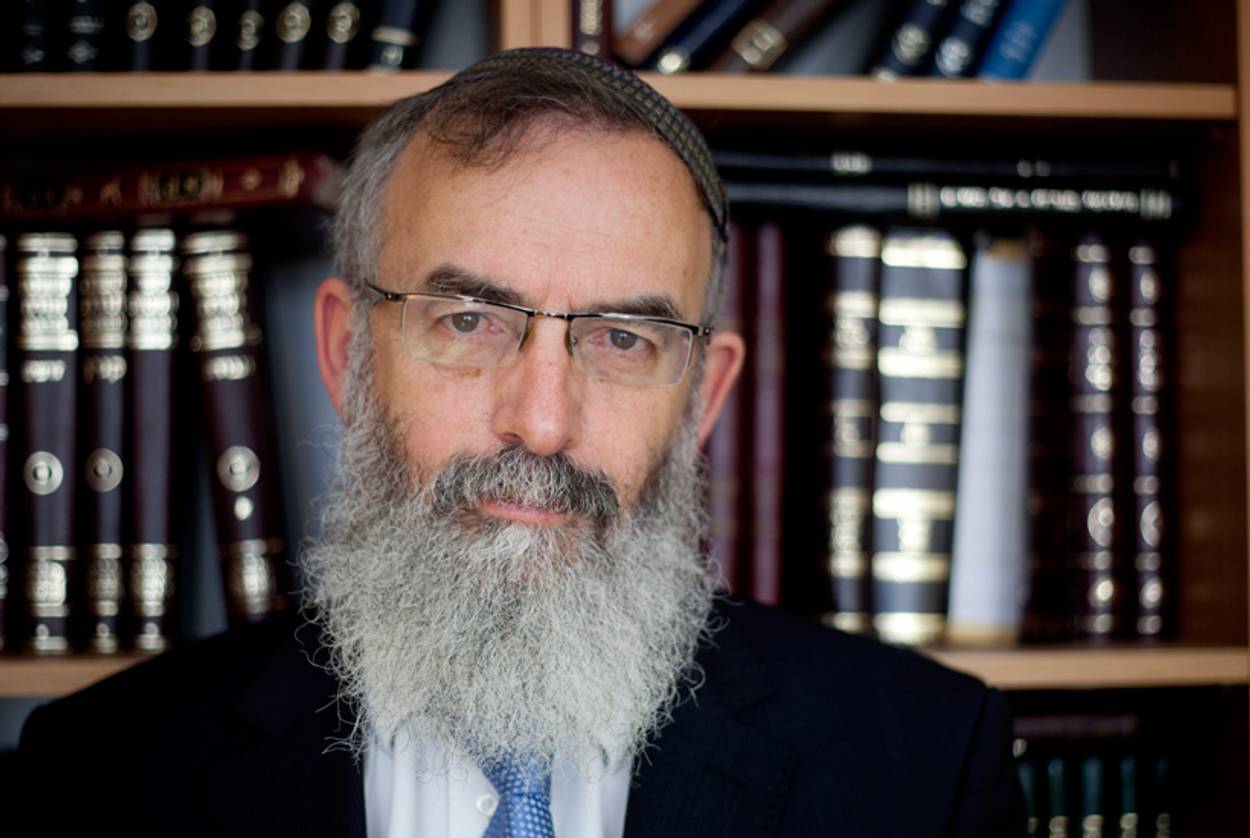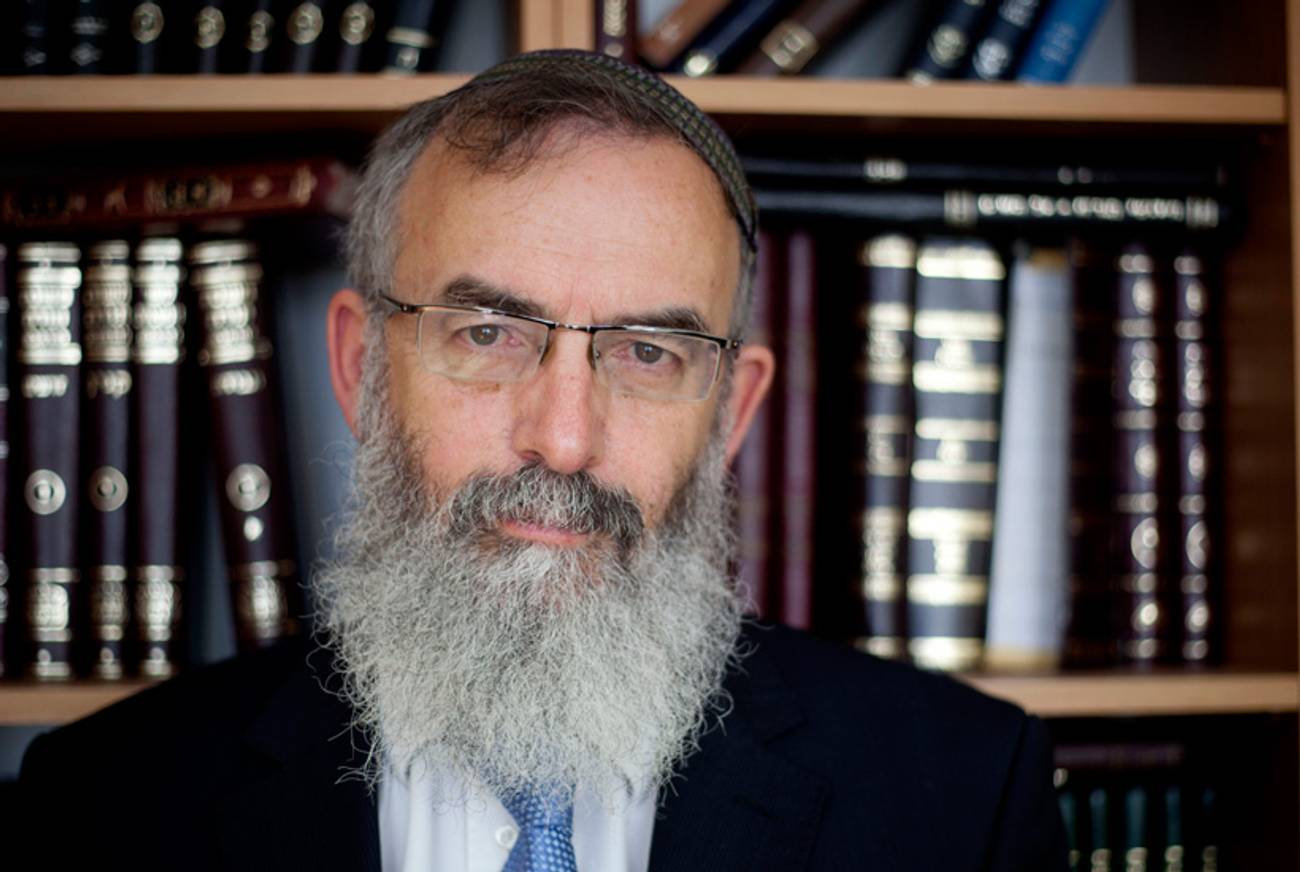Israel’s Next Chief Rabbi Has Illustrious Shoes To Fill—From Long Ago
Can David Stav, who is in line for the post, return it to the stature it held before his immediate predecessors?




Earlier this week, Israel’s religious Zionist party, known in recent years as Habayit Hayehudi (“the Jewish Home”) and now headed by Naphtali Bennett, threw its support behind David Stav, rabbi of the town of Shoham near Tel Aviv, for the post of Ashkenazi chief rabbi. Stav, who is 52 and the father of nine children, is best known in Israel as the co-founder of the Tzohar (“Window”) Rabbinical Organization, which seeks to integrate religious and secular Israelis. Elections will be held later this month among the 150 members of a public committee—who may by then number 200: The increase in members—including more women—will probably be beneficial to Stav, whose primary opponent, David Lau of Modi’in, is the son of a previous chief rabbi. Both current incumbents, Yonah Metzger and his Sephardi colleague Shlomo Amar—are approaching the end of their 10-year tenures, but Amar is expected to be re-elected in return for his (widely rumored) agreement to support Stav. On the same day that the Jewish Home made its announcement the Knesset’s Ministerial Committee for Legislation approved a bill that would allow Amar to serve a second term.
Political maneuvers on behalf of Stav’s candidacy for the job of chief rabbi were hardly limited to the Knesset. Haaretz reported that Amar and Stav had met in person at the New York bar mitzvah of the son of celebrity Israeli-born wonder rabbi Yoshiyahu Pinto, where Amar was accompanied by some of his strategic advisers. Nor did his campaign end there. Upon arriving in New York, according to the rabbinic news source the yeshivaworld.com, Stav made his way directly to the nearby shrine (ohel) of the putatively late Lubavitcher Rebbe in Queens, where he “was warmly greeted” by Rabbi Abba Refson, “director of the Chabad house at the Ohel.” The bushy-bearded Israeli rabbi then paid his respects, in the hope, presumably, of being repaid with the support of Israeli Chabad, which unlike most other Hasidic groups is not aligned with United Torah Judaism, a religious party whose leaders are hostile to Stav on account of his championing military service for ultra-Orthodox yeshiva students.
Are there indeed great issues at stake for the Jewish state in these electoral alignments of expatriate wonder rabbis, freshman MKs, and dead rebbes? Stav certainly thinks so. In an interview with Haaretz’s Ayelett Shani on Feb. 22, Stav boasted that “for the first time in the history of the state of Israel, the position of Chief Rabbi is being contested by someone who served in the army and whose children served in the army.” Is this truly any more than a slick PR line?
***
Let us begin with the outgoing (but hardly extroverted) Ashkenazi chief rabbi, whose ordination—despite his black rabbinical hat—is from Kerem Be-Yavneh, the first of Israel’s now-numerous Hesder yeshivot, which combine Torah study with (reduced) military service. Metzger served as a chaplain in the Seventh Armored Brigade—in which my oldest son served as well, albeit in a nonclerical position; Metzger was discharged with the rank of captain. But Stav apparently knows that unlike his children and mine, Metzger’s have not served in the army.
This, however, is hardly the most disgraceful aspect of the latter’s tenure as chief rabbi, in which scandal has followed scandal with alarming frequency. Shortly after Metzger’s election in 2003, after having served as rabbi of tony North Tel-Aviv (the equivalent of Manhattan’s upper East and West Sides), accusations surfaced (denied by Metzger) of having unlawfully demanded payment for performing weddings and of forging the signatures of witnesses on marriage contracts. There were also more furtive accusations of both homosexual and heterosexual harassment. Two years later it emerged that during Passover of 2005, as well as during holiday periods in previous years, Metzger and his family had stayed free of charge in Jerusalem’s Citadel Hotel although the government provides the chief rabbis with apartments in Jerusalem. Hotels such as the Citadel are heavily dependent, of course, on rabbinical supervision (offered at differing levels of stringency and hence cost) for their business—especially over holidays.
But perhaps most relevant for the contrast with his presumed successor, at an official IDF ceremony that took place in Jerusalem just over a year ago Capt. (res.) Metzger asserted that Torah study was an essential component of national security. “When yeshiva attendance is low,” he confidently announced, “as on holiday evenings or prior to the Sabbath, more IDF soldiers are injured or killed.” Beyond the stupidity of the assertion, for which he of course had no actual evidence, was the insensitivity toward the families of fallen soldiers whose lives might have been saved—he averred—by more yeshiva students spending more time in study. The claim that Torah study contributes as much to national security as commando combat has—until Yair Lapid’s recent showdown with the Haredis—been a hallmark of ultra-Orthodox arguments for exempting yeshiva students from military service. By uttering those words Metzger alienated himself from thousands of religious Zionists who send their sons (and sometimes their daughters) into the IDF’s most challenging units and who were prepared to ignore or question accusations concerning the chief rabbi’s moral standards.
Allegations regarding moral misconduct in the sexual sphere long ago eliminated from the current race a charismatic figure who was once widely expected to become Ashkenazic chief rabbi—Mordechai (“Motti”) Elon, youngest son of the recently deceased former Supreme Court judge and professor of Jewish law Menachem Elon. Elon was born and raised in Jerusalem. In 2006, while serving as head of Jerusalem’s Yeshivat Ha-Kotel—another of Israel’s oldest Hesder yeshivot—Elon was privately confronted by leaders of a recently established organization called Takanah (“Repair”), devoted to monitoring sexual abuse in the world of religious Zionism. He was presented with allegations of having sexually exploited young men, some of whom had remained close with him since his years (1987-2002) as principal of the Horeb boys high school in Jerusalem. The renowned rabbi, whose lectures on the week’s Torah portion had been so popular that they were broadcast live on national radio, quietly left Jerusalem and moved to the north, citing mysterious health reasons.
In early 2010 Takanah’s leaders felt obliged to go public with their accusations against Elon, who had allegedly not honored his private promises to them. He was eventually indicted in late 2011 on two counts of indecent assault allegedly committed against two 17-year-old boys between 2003-2005. Similar actions involving young men 18 and over were reportedly known to Takanah but could not be prosecuted legally. Several months ago, in February of 2013—the month in which his father died—the Jerusalem Magistrate Court dropped one of the charges against Elon, following the refusal of a witness to testify.
***
The rather tawdry spectacle that is now unfolding in Israel makes one wonder whether the country will ever again have a chief rabbi who is more than a mediocrity—quite unlike, it must be noted, the period from the British Mandate through the Jewish state’s early years. In 1983 Menachem Elon, already a member of Israel’s Supreme Court, was the candidate favored by Menachem Begin’s center-right coalition—which included the religious Zionist Mafdal party, the ancestor of today’s Jewish Home—for the largely ceremonial position of president. Somewhat mysteriously the secret ballot among members of Israel’s Knesset granted the victory to one of their own, the recently elected MK Chaim Herzog, who had served as an officer in both the British military (during World War II) and in the IDF, where he had twice been head of Military Intelligence. Of greater relevance was Herzog’s more recent stint as Israel’s envoy to the United Nations (1975-1978)—a post previously occupied by his brother-in-law Abba Eban—especially his famous speech in response to the General Assembly’s resolution condemning Zionism as racism, during which he tore up the official document in front of the assembled delegates.
With this dramatic gesture, Herzog was following in the footsteps of his revered father Isaac (1888-1959), Israel’s first Ashkenazi chief rabbi. In May of 1939, when Isaac Herzog was chief rabbi of Palestine, he led a march in Jerusalem against the notorious White Paper on the future of Palestine issued by the British government. During that demonstration he symbolically tore up the document, which called for limiting Jewish immigration despite the perils faced then faced by European Jewry. Herzog’s elder son Chaim joined the Hagganah in 1936 and then enlisted with the British army to fight in Europe. His intellectually gifted younger brother Jacob remained behind but served in Hagganah intelligence. Unlike David Stav, Rabbi Herzog could not claim that both he and his sons had served in uniform, but he did fight the White Paper ferociously.
No less courageous was Rabbi Herzog’s address in early June of 1944 at the eighth All Palestine Conference of the Mizrachi Organization held in Jerusalem—the religious Zionist organization that spawned the political party now headed by Netanyahu’s former head of staff Naphtali Bennett. Herzog opened by mourning the “horrible slaughter of millions of our brethren” as well as the destruction of great yeshivot such as those in Vilna, Grodno, Lublin, and Lomza—the last being his own birthplace. The chief rabbi also expressed his gratitude “to the Christian Churches—Roman Catholic, Greek Orthodox, as well as to the Anglican Churches—for their endeavors on behalf of suffering Jewry” and appealed, as might be expected, to the United Nations to “open the gates of Zion.” He also brazenly called upon the nations of the world “to bring a sin-offering to atone for the historic crime committed by you all against the Jewish people.”
But the most striking part of Herzog’s speech—later published in English as “the Present Gloom and the Prophetic Light”—was its last section, in which he called for a “spiritual revival” of the Jewish people in its historic land and for a Zionism that would not be “a mere secular movement … divorced from the words of God.” Palestine’s chief rabbi denounced Jewish secular nationalism as dangerously close to the “unbridled nationalism … which has brought about the present world destruction” and boldly asserted that “while secular Zionism denounces assimilation, it is itself guilty of spiritual assimilation, inasmuch as it would mold the rebuilding of Jewish nationhood in the form of alien nationalism.” True Jewish nationalism, in his view, drew upon the prophetic “vision of universal peace” and strove for “the spiritual perfection of the whole world.”
Which of today’s candidates for the position of Israel’s chief rabbi—Ashkenazi or Sephardi—could, or would, challenge the country’s political leadership in that way?
Stav’s primary interest is in such things as allowing Israelis to register for marriage with any rabbi in the country so that they won’t opt for civil marriage in Cyprus. But one hopes he will also have something to say, for example, to ultra-Orthodox Jews who like him have nine children but are unable or unwilling to find jobs to feed their own families. Will either he or his erstwhile rabbinical colleague Shai Piron—who ran as No. 2 on Lapid’s list and is now Israel’s education minister—have the courage to confront the Israeli people and its leaders on such issues as the country’s obscenely high poverty rate or its abysmal treatment of dark-skinned refugees from Africa? One can only hope. It may be too much to ask for someone with Rabbi Herzog’s unflinching courage, but perhaps we can at least get someone who cares about “the spiritual perfection of the whole world.”
***
Like this article? Sign up for our Daily Digest to get Tablet Magazine’s new content in your inbox each morning.
Elliott Horowitz, a resident of Jerusalem, is the author of Reckless Rites: Purim and the Legacy of Jewish Violence (Princeton) and co-editor of the Jewish Quarterly Review.
Elliott Horowitz, a resident of Jerusalem, is the author of Reckless Rites: Purim and the Legacy of Jewish Violence (Princeton) and co-editor of the Jewish Quarterly Review.